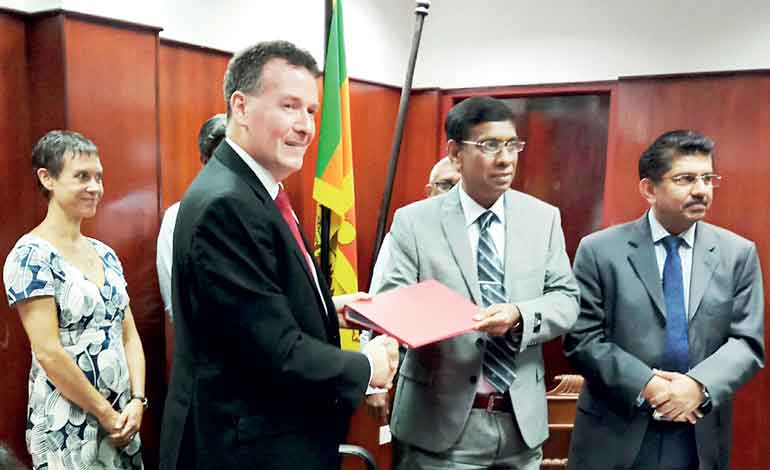Friday Feb 20, 2026
Friday Feb 20, 2026
Thursday, 8 February 2018 00:00 - - {{hitsCtrl.values.hits}}
 Australian High Commissioner Bryce Hutchesson with Ministry of Health and Indigenous Medicine Secretary Janaka Sugathadasa and Director General of Health Services Dr. Anil Jasinghe
Australian High Commissioner Bryce Hutchesson with Ministry of Health and Indigenous Medicine Secretary Janaka Sugathadasa and Director General of Health Services Dr. Anil Jasinghe
A self-sustaining program that helps provide long-term protection for communities from dengue has been given the official go ahead in Sri Lanka.
Monash University’s World Mosquito Program (WMP) is set to be rolled out in Sri Lanka following the signing of a Collaboration Agreement (CA) by Sri Lanka’s Secretary, Ministry of Health (MoH), Janaka Sugathadasa at a ceremony in Colombo with Australian High Commissioner Bryce Hutchesson.
The agreement advances the partnership between Sri Lanka and the WMP in tackling the threat of mosquito borne-viruses such as dengue in Sri Lanka.
It comes after Australian Foreign Minister Julie Bishop’s announcement last year of the AUD 1 million partnership and funding commitment to help establish the WMP in Sri Lanka.
With support from the Australian Government’s innovationXchange, WMP will use its ground-breaking research to trial the introduction of naturally occurring Wolbachia bacteria to Sri Lankan mosquito populations.
Wolbachia prevents dengue from being transmitted between people and also has the ability to block other mosquito-borne diseases such as Zika and chikungunya.
WMP Program Director Professor Scott O’Neill said the agreement was an important step in establishing the program in Sri Lanka.
“We are extremely pleased to be working with the National Dengue Control Unit, Ministry of Health, in seeking a long-term solution to the dengue burden in Sri Lanka. We look forward to rolling out the program to local communities in the Colombo area,” he said.
“Mosquito-borne viruses pose a global health threat for a number of reasons and our program provides an affordable solution to improving health security in the region.”
The program will be established across three sites in the Colombo area over the next 12 months, with the first mosquito releases to take place next year.
It’s hoped the program will expand its Wolbachia method to further sites in Sri Lanka in the future working in collaboration with local partners and subject to approval from the Sri Lankan Ministry of Health.
Since 2011, WMP has been conducting field trials using the Wolbachia method. Long term monitoring has shown that when a high proportion of mosquitoes in an area carry Wolbachia, local transmission of the disease has stopped. Sri Lanka is the tenth country to become part of the program, joining Brazil, Colombia, Australia, Indonesia, Vietnam, India, Fiji, Vanuatu and Kiribati.